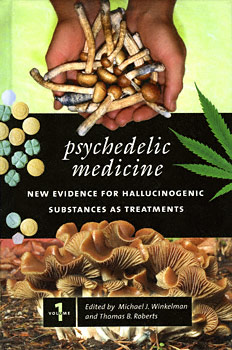
[an error occurred while processing this directive]
-- Harriet de Wit, Ph.D., Professor, Department of Psychiatry, University of Chicago
"Until they were caught up in the cultural revolution of the 1960s, hallucinogens were being seriously examined by top researchers for their potential to alleviate many human ills. The contributors to these volumes make a persuasive case that science should now do more to pursue these questions"
-- Professor Jonathan D. Moreno, University of Pennsylvania Center for Bioethics
"Roberts and Winkelman have assembled one of the most impressive and comprehensive collections of writings in the field of psychedelic medicine. The chapters, written by first-rate academic scholars, are rigorous and clear. The topics range from neuroscience to the legal, spiritual, medicinal, and ethical implications of using this novel class of agents. This work is an invaluable resource for educators, clinicians, and policy makers."
-- Stephen Ross, M.D., Director, Division of Alcoholism and Drug Abuse, Bellevue Hospital
"These volumes present fresh ideas for using psychedelic drugs as therapeutic agents to treat some of the most intractable of psychological ailments. Thanks to these forward thinking educators, researchers, and clinicians, we now have new paths to explore in the cure for old diseases."
-- Nicholas V. Cozzi, Ph.D., Department of Pharmacology, University of Wisconsin School of Medicine and Public Health
BLURBS #
"These books are a comprehensive and scholarly review of the current status of the therapeutic potential of hallucinogens. The contributors represent an outstanding group of scientists, scholars, and clinicians, most of whom have had direct experience using and administering these drugs in either therapeutic or religious contexts. The result is an impressive collection. The authors provide scholarly historical reviews of the use of these drugs, as well as detailed instructions and advice for the clinician on how to administer these drugs safely and effectively in a therapeutic context. They provide a balanced view and acknowledge the many risks and pitfalls of improper use of these drugs. Likely to be of interest to scientists, clergy, mental health professionals, and anyone interested in the mind, these books provide an up-to-date review of the status of hallucinogens in modern medicine, as well as a historical review of their status in the past. This set is highly recommended."-- Harriet de Wit, Ph.D., Professor, Department of Psychiatry, University of Chicago
"Until they were caught up in the cultural revolution of the 1960s, hallucinogens were being seriously examined by top researchers for their potential to alleviate many human ills. The contributors to these volumes make a persuasive case that science should now do more to pursue these questions"
-- Professor Jonathan D. Moreno, University of Pennsylvania Center for Bioethics
"Roberts and Winkelman have assembled one of the most impressive and comprehensive collections of writings in the field of psychedelic medicine. The chapters, written by first-rate academic scholars, are rigorous and clear. The topics range from neuroscience to the legal, spiritual, medicinal, and ethical implications of using this novel class of agents. This work is an invaluable resource for educators, clinicians, and policy makers."
-- Stephen Ross, M.D., Director, Division of Alcoholism and Drug Abuse, Bellevue Hospital
"These volumes present fresh ideas for using psychedelic drugs as therapeutic agents to treat some of the most intractable of psychological ailments. Thanks to these forward thinking educators, researchers, and clinicians, we now have new paths to explore in the cure for old diseases."
-- Nicholas V. Cozzi, Ph.D., Department of Pharmacology, University of Wisconsin School of Medicine and Public Health


